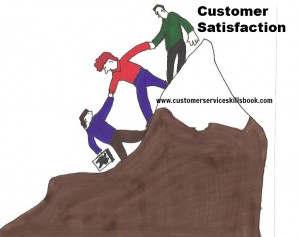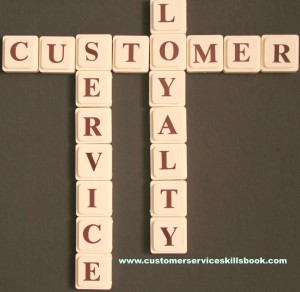Three Simple Strategies To Encourage Customer and Brand Loyalty
Customer service representatives and all other employees in the organization should have one goal in mind when interacting with other…building stronger customer-service provider relationships.
The global economy of today is dominated by technology. That puts your competitors from around the world only one mouse click away from your customers if they decide that you are not delivering as the expect or you promised. No one in your organization can be complacent when it comes to addressing the needs, wants and expectations of your customers. Customer relations should be a high-priority effort for all employees.

Whenever and wherever a touchpoint (contact with a current or potential customer) occurs, it is a unique opportunity to show that you and your organization provide not only good or excellent customer service but that you provide the BEST customer service! Throughout any interaction, you should make it your goal to project a positive service image and that you add value to the customer relationship.
The following are three simple strategies that employees and organizations can use to help build the brand and organizational loyalty.
1. Recognize the customer. Whenever a customer enters, calls or contacts you electronically, stop what you are doing and make them the focal point of your attention. If you know their name, smile and use it immediately. If not, ask for the name and then use it occasionally throughout the interaction. This demonstrates that you are concerned about them on an interpersonal level and value them as an individual.
2. Show appreciation. Thank your customers at the end of a transaction and wait for them to leave, disconnect or close the communication before you do. Often customers will think of one more thing they want to say or ask at the end of a conversation. If you abruptly end the contract, they might feel cut off and lose the opportunity to get the needed information. In such instances, any positive good will earned for excellent service to that point could be lost.
3. Seek opportunities to demonstrate value. Never assume that customers recognize the value you provide. They have too many things going on in life on a given day to stop and reflect on what you provide for them. You need to continually do things to encourage brand loyalty.
Many organizations remind customers that they saved money, time, effort and other valuable elements whenever possible. To get an idea of how this works, look at your sales receipt the next time you make a retail purchase. Does it thank you and demonstrate value? For instance, at the bottom of an Office Depot receipt, you will see a catalog list price or what the product would have cost at the manufacturer’s suggested retail price, Office Depot’s low everyday price, how much you saved, and a note thanking you for saving at Office Depot. Minor reminders such as this are a quick and easy way to encourage people to return for additional needs.
No matter what system you implement, make sure that you show that you are sincere in your appreciation for your customers.
About Robert C. Lucas
Bob Lucas has been a trainer, presenter, customer service expert, and adult educator for over four decades. He has written hundreds of articles on training, writing, self-publishing, and workplace learning skills and issues. He is also an award-winning author who has written thirty-seven books on topics such as, writing, relationships, customer service, brain-based learning, and creative training strategies, interpersonal communication, diversity, and supervisory skills. Additionally, he has contributed articles, chapters, and activities to eighteen compilation books. Bob retired from the U.S. Marine Corps in 1991 after twenty-two years of active and reserve service.
Make Money Writing Books: Proven Profit Making Strategies for Authors by Robert W. Lucas at Amazon.com.
The key to successfully making money as an author and/or self-publisher is to brand yourself and your company and to make yourself and your book(s) a household name. Part of this is face-to-face interaction with people at trade shows, library events, book readings, book store signings, blogging or guest blogging on a topic related to their book(s). Another strategy involves writing articles and other materials that show up online and are found when people search for a given topic related to a topic about which the author has written.
If you need help building an author platform, branding yourself and your book(s) or generating recognition for what you do, Make Money Writing Books will help. Bob’s popular book addresses a multitude of ideas and strategies that you can use to help sell more books and create residual and passive income streams. The tips outlined in the book are focused to help authors but apply to virtually any professional trying to increase personal and product recognition and visibility.
In my book Customer Service Skills for Success, I define customer service as “the ability of knowledgeable, capable, and enthusiastic employees to deliver products and services to their internal and external customers in a manner that satisfies identified and unidentified needs and ultimately results in positive word-of-mouth publicity and return business.”










